Quick answer: The Best VPN for School WiFi in 2024 is NordVPN!
| NordVPN | ExpressVPN |
|---|---|
 www.nordvpn.com NordVPN Price: Servers: 6000+ in 111 countries Simultaneous connections: 6 Jurisdiction: Panama Payment: PayPal, AmazonPay, Crypto, Google Pay, Klarna Torrenting: OK Unblocks US Netflix: Yes Encryption: IKEv2/IPSec, AES-256, OpenVPN, NordLynx Dedicated IP: $3.69/month TrustPilot Score: 4,2/5 Money-back: 30 days Extra: Double VPN, Obfuscated servers NordVPN review |
www.expressvpn.com ExpressVPN Price: Servers: 3300+ in 105 countries Simultaneous connections: 8 Jurisdiction: British Virgin Islands Payment: PayPal, Crypto, AliPay, Klarna, Torrenting: OK Unblocks US Netflix: Yes Dedicated IP: Not provided TrustPilot Score: 4,4/5 Money-back: 30 days ExpressVPN review |
Navigating the limitations of school WiFi can be a frustrating experience for students seeking unrestricted access to educational resources and the internet at large. With schools often implementing strict firewalls and content filters, the need for a reliable and secure VPN (Virtual Private Network) becomes a necessity rather than a luxury.
In this comprehensive guide, we delve into the best VPNs for school WiFi, focusing on their ability to bypass restrictions, maintain security, and ensure privacy. We understand that students require access to a wide range of online resources for their educational needs, and a suitable VPN can facilitate this access while safeguarding their online activities.
From discussing the importance of using a VPN in a school environment to reviewing the top VPN options that cater to speed, security, and ease of use, this article is your go-to resource. Whether you’re researching for a project, accessing learning platforms, or simply browsing the internet, our recommendations aim to provide you with uninterrupted and secure internet access. Join us as we explore the best VPN solutions for school WiFi, designed to enhance your online educational experience.
| VPN Service |
|---|
 www.nordvpn.com NordVPN Review |
| Price: Servers: 5500+ in 59 countries Simultaneous connections: 6 Jurisdiction: Panama Payment: PayPal, AmazonPay, Crypto, Google Pay, Klarna Torrenting: OK Unblocks US Netflix: Yes Dedicated IP: $70/yr TrustPilot Score: 4,7/5 Money-back: 30 days Extra: Double VPN, Obfuscated servers Visit NordVPN » |
| www.expressvpn.com ExpressVPN Review |
| Price: Servers: 3300+ in 94 countries Simultaneous connections: 5 Jurisdiction: British Virgin Islands Payment: PayPal, Crypto, AliPay, Klarna, Torrenting: OK Unblocks US Netflix: Yes Dedicated IP: Not provided TrustPilot Score: 4,7/5 Money-back: 30 days Visit ExpressVPN » |
 www.cyberghostvpn.com CyberGhost Review |
| Price: Servers: 6600+ in 89 coutrines Simultaneous connections: 7 Jurisdiction: Romania Payment: PayPal, Crypto Torrenting: OK Unblocks US Netflix: Yes Dedicated IP: $51/yr TrustPilot Score: 4,8/5 Money-back: 45 days Visit CyberGhost » |
 www.surfshark.com Surfshark |
| Price: Servers: 3200+ in 65 coutrines Simultaneous connections: Unlimited Jurisdiction: British Virgin Islands Payment: PayPal, Crypto, Google Pay, Amazon Pay Torrenting: OK Unblocks US Netflix: Yes Dedicated IP: Not provided TrustPilot Score: 4,3/5 Money-back: 30 days Visit Surfshark » |
 www.purevpn.com PureVPN Review |
| Price: Servers: 6500+ in 140 coutrines Simultaneous connections: 10 Jurisdiction: Hong Kong Payment: PayPal, Credit Cards Torrenting: OK Unblocks US Netflix: Yes Dedicated IP: $35.88/yr TrustPilot Score: 4,7/5 Money-back: 31 days Visit PureVPN » |
What are VPNs?
A Virtual Private Network is a type of network that allows you to create a secure connection to another network or device over the internet. You can use it to shield your browsing activity, as well as access restricted websites and services. To put it simply, a Virtual Private Network is a network within another network, usually in the wild jungle of what we refer to as the Internet.
Let’s paint a picture here. Imagine a spider web. If you were to cut out specific portions or quadrants of the web, you’d be, in a sense, creating smaller, self-contained webs or networks. In a similar way, you can use VPN technology to virtually create smaller, specialized and more secure networks within the large web that is the Internet.
Now, why do I need a VPN for School WiFi?
VPNs can have a wide variety of applications. However, we can boil those down to a handful of the most common uses that could help you in school or college.
Privacy
It may not be your case, but a lot of people don’t feel comfortable with having their online activity or personal data viewed or registered. Ever wonder how that site knows where you are so as to tell you about all the amazing offers in your area? It’s actually not that complicated. The site just checks the geographical location of the IP address you’re connecting from. When it has that data, it then links content targeted at that area.
One way to keep out this type of spam advertising is by using a VPN. A VPN can protect you from such things in two ways:
- By disallowing access to your location information
- By throwing the ads off your trail, telling them that you’re somewhere else entirely.
At school, this may help you stay safe from network “spoofers” or monitors that look for exploitable vulnerabilities in order to reach your data.
Security
VPNs use various forms of encryption to protect your data. Therefore, you can be sure that nosey interlopers can’t get a peek at your content, even if they do manage to break into your private network. It would be like a burglar breaking into your office; he’ll find that he can’t read your documents because they are in some type of code.
Interested parties who need to keep their data private find this very useful. For instance, with a VPN, employees can access data and otherwise connect to secure company networks or devices from unknown, insecure or unverified locations or networks. Think of a traveling salesman needing to access inventory or payroll information from an airport or bus station from god-knows-where. You never know who might be screening the connection. So, if you need to access confidential data (like lab results, related to your thesis research), this is a must.
Restriction or censorship
There may be a variety of reasons why you might find yourself restricted or censored when trying to access content online. But, in any case, VPNs provide an option for working around such restrictions. The example we mentioned at the beginning of this article is a good premise for a legitimately hindering situation. Others might include:
- geographic service blocking or restriction (such as reduced Netflix functionality in different regions, or flight price adjustments based on location)
- state-sponsored censorship, like that present in China, Iran, and North Korea.
Yet another case is productivity-based site blocking at the office, keeping you from non-essential websites. These are all obstacles around which VPNs can help. It can either “relocate” you, cover or disguise your network traffic, or trick filters and restrictors into not applying to your activity. Therefore, a VPN is an excellent tool if you need academic information that may be unavailable in your region.
What is the Best VPN for School WiFi to Unblock Apps?
Nowadays, setting up a VPN is a relatively simple procedure. Moreover, the growing demand for the features provided by VPNs has caused a plethora of services to pop up. Today we have a great variety – from the basic, simplified free VPNs offered on a multitude of sites to the robust, customized VPNs offered at a premium.
Most VPN offers include detailed setup and configuration instructions. As mentioned earlier, that can be anything from just a few clicks to in-depth network setups that require substantial technical know-how. Therefore, have a look around, compare functionality, features, and costs to choose the best option for your needs.
1. Best VPN for School WiFi in October 2024
1.1 NordVPN – Best Overall School WiFi VPN
1.2 ExpressVPN – Fastest VPN for School WiFi
ExpressVPN is a strong choice for use with school WiFi for several reasons:
-
Bypassing Internet Restrictions: Schools often implement internet filters and restrictions to limit access to certain websites and online services. ExpressVPN can effectively bypass these restrictions, allowing students and staff to access a wider range of internet resources for educational, research, or personal purposes.
-
Enhanced Security on Public Networks: School WiFi networks, like other public WiFi networks, can be vulnerable to security risks such as hacking or data interception. ExpressVPN provides strong encryption, protecting users’ data and online activities from potential threats. This is crucial for safeguarding personal information, especially when transmitting sensitive data over the school’s network.
-
Maintaining Privacy: Using a VPN like ExpressVPN helps maintain privacy by hiding the user’s IP address and encrypting internet traffic. This is particularly important in a school environment where network administrators may have the ability to monitor internet activity. With ExpressVPN, students and staff can ensure that their browsing history and online communications remain private.
-
Accessing Geographically Restricted Content: ExpressVPN’s extensive network of servers in various countries enables users to access content that may be geographically restricted. This is beneficial for educational purposes, such as accessing international research databases, educational platforms, or diverse news sources that might be restricted on the school’s network.
-
Reliable Connection and Speed: ExpressVPN is known for its reliable connections and fast speeds, which are essential for a seamless online experience. This ensures that schoolwork, research, and other educational activities that require a stable internet connection can be conducted without interruptions or significant lag.
-
Ease of Use: ExpressVPN offers a user-friendly interface, making it easy for students and staff to connect to the VPN without requiring extensive technical knowledge. This simplicity is important in a school setting where users might have varying levels of tech-savvy.
-
Compatibility with Multiple Devices: ExpressVPN supports a wide range of devices and platforms, which is advantageous in a school setting where users may access the WiFi network through different types of devices, including laptops, tablets, and smartphones.
In summary, ExpressVPN’s ability to bypass restrictions, coupled with its strong security features, privacy protection, reliable performance, and user-friendly design, makes it an excellent VPN choice for individuals using school WiFi networks. It allows users to safely and effectively access a broader range of internet resources, which can be particularly beneficial in an educational context.
1.3 Private Internet Access VPN – Secure VPN for School WiFi
Private Internet Access (PIA) is a strong choice as a VPN for School WiFi for several reasons:
-
Strong Encryption: PIA offers robust encryption, which is essential when using a school WiFi network. This encryption protects your internet traffic from being monitored or intercepted, ensuring that your online activities, such as browsing or communicating, remain private.
-
Bypassing Network Restrictions: School WiFi networks often have restrictions on accessing certain websites or services. PIA can help bypass these restrictions, allowing students and faculty to access a broader range of online resources and tools that might be blocked on the school network.
-
Prevention of Bandwidth Throttling: Some school networks may implement bandwidth throttling on certain types of traffic or during peak usage times. Using PIA can help avoid this throttling, ensuring consistent internet speeds necessary for activities like research, streaming educational content, or participating in online courses.
-
Protection on Public WiFi: School WiFi, being a public network, can be vulnerable to security risks. PIA secures your connection, protecting you from potential threats like hacking or data interception that are more common on public networks.
-
No Traffic Logs Policy: PIA has a strict no-logs policy, meaning it doesn’t track or store records of your internet activity. This is crucial for privacy-conscious users who want to ensure their online activities aren’t recorded, especially in a school environment where network administrators might monitor traffic.
-
Multiple Device Support: PIA allows multiple simultaneous connections. This is beneficial for students or educators who use several devices, such as smartphones, tablets, and laptops, and want all their devices to be protected.
-
Easy to Use: PIA offers user-friendly apps for various platforms, making it accessible for users of all technical skill levels. This ease of use is important in a school setting where users may not have advanced technical knowledge.
In summary, Private Internet Access’s strong encryption, ability to bypass network restrictions, prevention of bandwidth throttling, security on public networks, no-logs policy, support for multiple devices, and user-friendliness make it a suitable VPN for school WiFi environments. These features collectively ensure secure, private, and unrestricted internet access, which is beneficial for educational purposes.
Private Internet Access Review
1.4 CyberGhost – Safe VPN for School WiFi
CyberGhost is a particularly effective VPN choice for use with school WiFi for several reasons:
-
Strong Encryption and Security: CyberGhost uses high-grade encryption to secure your internet connection. This is crucial in a school environment where the WiFi network is shared among many users, potentially exposing you to security risks. The encryption protects your personal information and online activities from being intercepted or monitored.
-
Bypassing Network Restrictions: Schools often have restrictive internet filters blocking access to certain websites or services. CyberGhost can help bypass these restrictions, allowing students and staff to access a broader range of internet resources for educational or personal use.
-
Protecting Online Privacy: In a school setting, where network administrators may have the ability to track online activities, CyberGhost ensures your browsing remains private. This is especially important for maintaining the confidentiality of your internet use, be it for research, accessing resources, or personal browsing.
-
Ease of Use: CyberGhost offers a user-friendly interface, which is beneficial for students and staff who might not be technically savvy. Easy installation and simple operation mean that users can quickly set up the VPN on their devices without requiring extensive technical knowledge.
-
Wide Server Network: With a vast network of servers globally, CyberGhost provides multiple options for connecting to different locations. This is useful for accessing content that may be geo-restricted in the school’s location.
-
No Bandwidth Limits: CyberGhost does not restrict bandwidth, which is important for activities that require high data usage, such as streaming educational videos, participating in online courses, or downloading large academic materials.
-
Compatibility with Multiple Devices: School users often have a range of devices (laptops, tablets, smartphones). CyberGhost’s compatibility with various devices and operating systems means it can be used across all these gadgets, providing flexibility and convenience.
-
Public WiFi Safety: Using CyberGhost on school WiFi, which is essentially a public network, adds an extra layer of security, safeguarding against potential threats like hacking or malware, which are more common on public networks.
In summary, CyberGhost’s strong security features, ability to bypass network restrictions, ease of use, and wide server network make it an excellent VPN choice for school WiFi environments. It offers both the security necessary for a shared network and the freedom to access a wide range of internet resources, enhancing the educational and personal browsing experience within school premises.
1.5 Surfshark VPN – Best Budget VPN for School WiFi
Surfshark is an excellent VPN choice for use with school WiFi for several reasons:
-
Bypassing Network Restrictions: Schools often have restrictions on their WiFi networks to block access to certain websites or services. Surfshark can help bypass these restrictions, allowing students and staff to access a broader range of internet resources for educational and personal use.
-
Maintaining Privacy and Security: On school WiFi networks, which are usually public, privacy can be a concern. Surfshark provides strong encryption, ensuring that your online activities, personal information, and communications are secure and private from potential snoopers.
-
Preventing Bandwidth Throttling: Schools might implement bandwidth throttling to restrict the usage of certain services, such as streaming or gaming sites. Surfshark can mask your internet activity, helping to prevent your connection from being throttled and maintaining consistent internet speeds.
-
Unlimited Device Connections: Surfshark allows an unlimited number of simultaneous device connections under one subscription. This feature is particularly beneficial in a school setting where you might have multiple devices like a smartphone, tablet, and laptop.
-
Ad-Blocking and Malware Protection: Surfshark includes an ad-blocking feature and malware protection. These features enhance your browsing experience on school WiFi by blocking unwanted ads and protecting against potential online threats.
-
No-Logs Policy: Surfshark has a strict no-logs policy, meaning it doesn’t track or store your online activities. This is important for users who are concerned about their digital footprint, especially in an environment like a school where network monitoring might occur.
-
Ease of Use: Surfshark is user-friendly, with easy-to-navigate apps and simple setup processes. This makes it accessible even to those who are not particularly tech-savvy, which can be a great advantage in a school environment.
-
Global Server Network: Surfshark offers a wide range of server locations. This global network can be beneficial for accessing content from different regions, which can be a valuable asset for research and educational purposes.
In summary, Surfshark’s ability to bypass network restrictions, its strong focus on privacy and security, prevention of bandwidth throttling, unlimited device connections, ad-blocking, no-logs policy, user-friendliness, and global server network make it a suitable and advantageous VPN choice for use with school WiFi.
My School Blocked The VPN…What now?
Obviously, if a workaround for some obstacle exists, there will sometimes be obstacles to the workaround as well! For various reasons, companies, organizations, and authorities choose to block VPNs.
There are two basic variants of this. The first variant prevents you from accessing VPN-related sites and services. Meanwhile, the second one relates to your network activity, which may be subject to monitoring, identification, and prevention. But, there are, of course, workarounds for even these counter-workarounds! If someone blocked your VPN, there are three basic ways to get around it.
The simplest, most straightforward way to get around a VPN block would be to switch the network you are using. For instance, using your mobile data either directly on your mobile device or as a hotspot for your computer.
Secondly, because of how VPN blocks work (either blocking specific ports or data packet identifiers knows as “headers”), by switching the port we are using, we might be able to get around a VPN block. Many VPN services have an integrated feature to do this. So, by simply enabling certain options, we might be on our way. Some VPN networks may even have this option enabled by default, getting a leg up on the countermeasures.
The third option for defeating VPN blocks by your school or college involves using “obfuscation.” This method allows VPN data packets to be disguised, or “stealthed” toward screening. A lot of VPN services have this feature included, which is why they are also sometimes referred to as “stealth VPNs.”
Additionally, you can route VPNs over the Tor network. That way, you will not only unblock them but also give them maximum privacy. Still, this is a more advanced solution that carries its own pros and cons. Nevertheless, some VPN services may have this functionality integrated, as well. On a related note, if the blocking in question simply doesn’t allow us to access VPN-related sites (like the library’s Wi-Fi), there is one last trick we can try.
By downloading and setting up all our VPN-related material beforehand, on another network, we may be able to run our VPN on blocked networks.
Final thoughts
VPN accessibility in school or university is useful and sometimes even necessary. Therefore, by keeping in mind the limitations and implications of VPNs, we can improve both our experience and results in academic settings. But, just like every powerful tool, we ought to use VPNs responsibly. Our current pick for the best VPN for school WiFi to unblock apps is NordVPN in the table above.
We earn commissions using affiliate links.
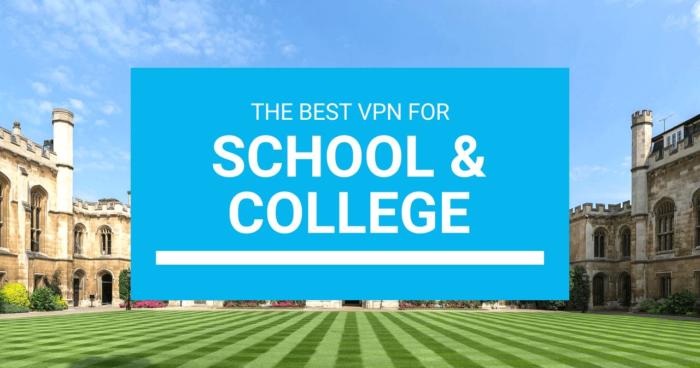

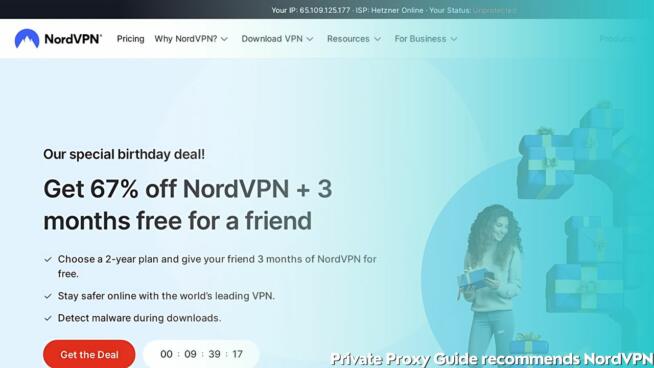
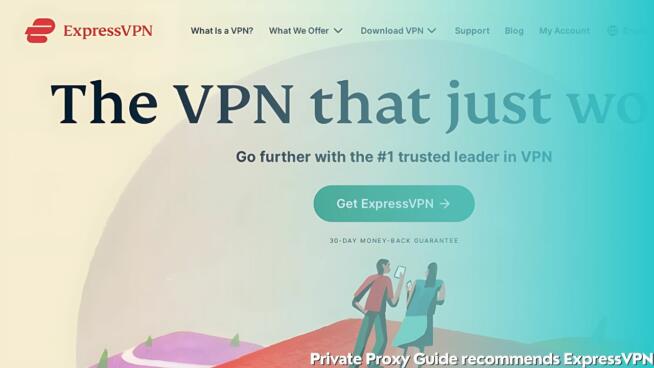
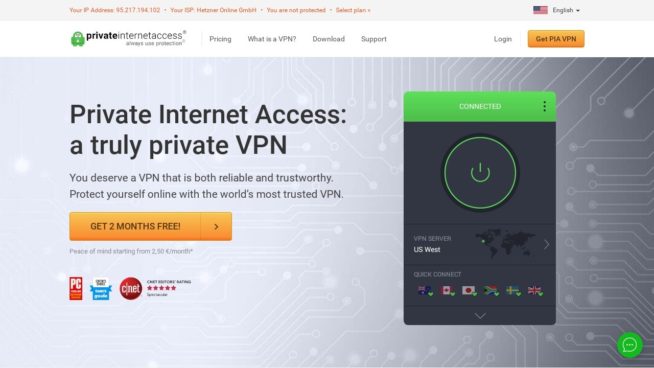
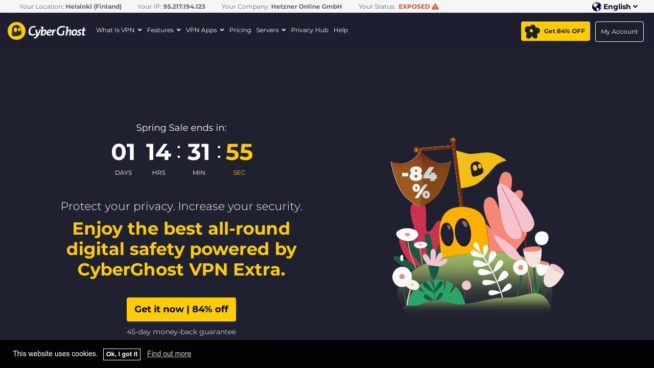
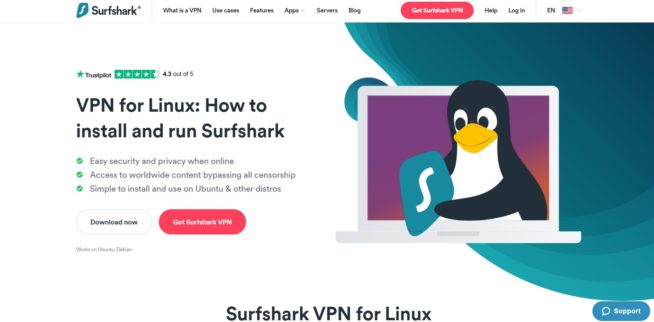
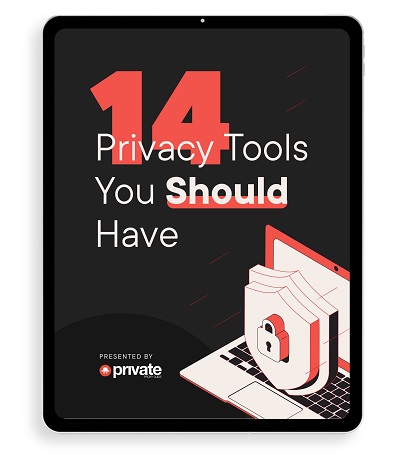
![School and College VPN Alternatives ([year]) Best VPN for School and College-4](https://www.privateproxyguide.com/wp-content/uploads/2022/09/Best-VPN-for-School-and-College-4-150x150.jpg)
![Eero WiFi Routers VPN Alternatives ([year]) Best VPN for Eero](https://www.privateproxyguide.com/wp-content/uploads/2022/04/Best-VPN-for-Eero-150x150.jpg)

![Is Airport WiFi Safe in [month] [year]? Is Airport wifi safe](https://www.privateproxyguide.com/wp-content/uploads/2021/12/Is-Airport-wifi-safe-150x150.jpg)
![Best Mesh WiFi Systems in [month] [year] Best Mesh WiFi Systems](https://www.privateproxyguide.com/wp-content/uploads/2022/07/Best-Mesh-WiFi-Systems-150x150.jpg)
![Best WiFi Analyzers for Android, iPhone & PC in [year] Best Wifi Analyzers](https://www.privateproxyguide.com/wp-content/uploads/2022/09/Best-Wifi-Analyzers-150x150.jpg)

![Kodi VPN Alternatives [year] Best VPNs for Kodi 2021 - To Avoid Buffering & Other Issues](https://www.privateproxyguide.com/wp-content/uploads/2018/05/kodi-launch-logo-150x150.jpg)
![PS4 & PS5 VPN Alternatives ([year]) Best VPN for PS4 2021](https://www.privateproxyguide.com/wp-content/uploads/2018/07/Best-VPN-for-PS4-150x150.jpg)
![DraftKings VPN Alternatives ([year]) Best VPN for DraftKings](https://www.privateproxyguide.com/wp-content/uploads/2018/07/Best-VPN-for-DraftKings-150x150.jpg)
![Fortnite VPN Alternatives ([year]) Best VPN for Fortnite](https://www.privateproxyguide.com/wp-content/uploads/2018/07/Best-VPN-for-Fortnite-BattleRoyale-150x150.jpg)
![Bet365 VPN Alternatives ([year]) Best VPN for Bet365](https://www.privateproxyguide.com/wp-content/uploads/2018/08/best-vpn-for-bet365-150x150.jpg)
![Showbox VPN Alternatives ([year]) Best VPN for Showbox](https://www.privateproxyguide.com/wp-content/uploads/2018/08/best-vpn-for-showbox-150x150.jpg)
![Popcorn Time VPN Alternatives ([year]) BEST VPN for Popcorn Time](https://www.privateproxyguide.com/wp-content/uploads/2019/01/best-vpn-for-popcorn-time-150x150.jpg)
![Apple TV 4K VPN Alternatives ([year]) Best VPN for Apple TV 4K 2021](https://www.privateproxyguide.com/wp-content/uploads/2019/02/Best-Vpn-for-apple-tv-4k-150x150.jpg)